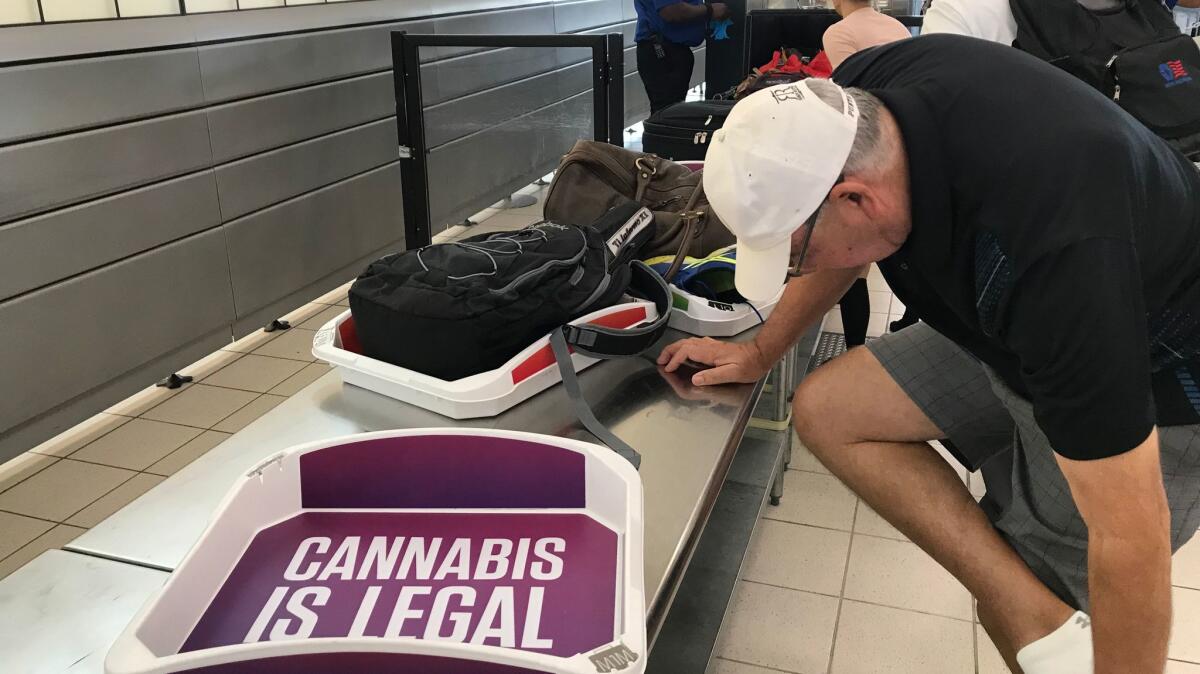California Journal: Postscripts on the big stories of 2017: Wildfires, sex harassment and the end of pot prohibition

- Share via
Twenty-five years ago, after months of unrelenting family scandal, the queen of England uttered a phrase that has sprung to mind more than once in 2017.
“Nineteen ninety-two is not a year on which I shall look back with undiluted pleasure,” Elizabeth said in a speech marking the 40th anniversary of her accession to the throne. “It has turned out to be an annus horribilis.”
And so it has been, in many ways, for us this year.
Wind-driven firestorms devastated our state, killing dozens of people and destroying thousands of homes. Sexual harassment allegations torched the careers of so many prominent men in Hollywood, Sacramento and elsewhere that most of us have lost count.
California is at war with the federal government over climate change and immigration. The citizenship dreams of young people brought to this country as babies have been smashed by a president who behaves as if he is a potentate.
The shortage of affordable housing has made life hell for Californians of modest means, and created an intractable cycle of homelessness for those who fall through the social safety net.
And yet, there have been some bright spots.
Notably, 2017 brought the implementation of Proposition 64, the landmark California ballot initiative that ended cannabis prohibition and is expected to provide a substantial revenue stream to state and local coffers and reverse the persecution of thousands caught up in a failed war on pot.
Three topics dominated my columns this year: cannabis, sexual harassment and wildfires. I offer postscripts on one of each:
::
With cannabis legalization, the outlaw pot culture is giving way to a new, regulated marijuana industry. Starting in 2018, the growing, manufacturing, distributing and selling of cannabis will be legal, as long as companies are able to successfully navigate onerous state and local licensing requirements.

At some point, the federal government, which still classifies cannabis as a dangerous, illegal drug, will have to come to its senses. At some point, cannabis entrepreneurs will have to be able to use federally insured banks, something that is not allowed now. This means that cannabis will continue to be a mostly cash business, which is a risk to public safety, and just plain dumb.
I thought perhaps things were changing in October, when I went through a security line at Ontario International Airport and found myself staring at TSA trays that said “Cannabis is Legal.” (In smaller print, they said, “Traveling with it is not. Leave it in California.”)
It was a groundbreaking ad campaign by Organa Brands, one of the largest companies in the cannabis industry.
“We were trying to raise awareness,” said Organa co-founder Jeremy Heidl. “It was very well received by travelers.”
Airport authorities and the TSA, however, were less than entranced, particularly after my column on the campaign garnered attention from media outlets all over the country.
“We are not clear as to exactly where the issue came from, but we were asked to remove the copy,” said Joseph Ambrefe, chief executive of Security Point Media, which sells ad space on the plastic security trays.
“The final say is up to the airport,” said Lucy Martinez, a spokeswoman for TSA headquarters in Virginia. “But we can say if something doesn’t look good or isn’t appropriate.”
Martinez could not say whether the TSA raised an objection, but added, “If it’s about marijuana, I am assuming, and this is my opinion, it just doesn’t look good, it’s something that is not appropriate for the airport.”
The “Cannabis is Legal” campaign lasted just over a month.
“I think it was worth it,” Heidl said. “It got a lot of attention, so that was nice.”
::
I look upon 2017’s head-spinning torrent of sexual harassment allegations as the feel-good story of the year, if not the new century.
How can you not be thrilled that misbehaving men such as Matt Lauer, Charlie Rose, Harvey Weinstein, Russell Simmons, Kevin Spacey and Mark Halperin (to name a few) have been outed and ousted.
Finally, four decades after the concept of sexual harassment was enshrined in law, and 26 years after Anita Hill’s accusations against then-Supreme Court nominee Clarence Thomas propelled the issue into the public consciousness, women (and the occasional male victim) are being heard and harassers are on notice.
And yet, stardom continues to blind us.
A couple of weeks ago, I watched the fawning coverage of Kobe Bryant as the Lakers retired his jerseys. I was repulsed that almost no one thought to mention the great stain on his career.
To refresh your memory, Bryant was charged with raping a 19-year-old hotel worker in Colorado in 2003. He admitted to investigators that he bruised her neck when he choked her (he called it “the strangling thing”) but claimed the sex was consensual.
The charge against him was dropped after the victim, whose life was threatened when she was publicly identified, refused to testify. (Who can blame her?) As part of the agreement to drop the charge, Bryant was forced to publicly apologize. “Although I truly believe this encounter between us was consensual,” he wrote, “I recognize now that she did not and does not view this incident the same way I did.”
This response became the mantra for almost all the high-profile harassers who were outed this year. It was disingenuous in 2003, and it’s even more disingenuous now.
::
I am often asked about the Shepherds, a family whose tragic story touched readers’ hearts.
On Oct. 9, when the fire came to Mendocino County, the Shepherds were at their hilltop home in Redwood Valley, at the end of a long, isolated driveway. Jon and Sara Shepherd and their two teenagers tried to flee in two vehicles, but became trapped by walls of flames.
They tried to escape on foot, but were overcome. Kai, 14, died on the road. Kressa, 17, succumbed to her injuries three weeks later, after both of her legs had been amputated above the knee.
Jon, 45, suffered severe burns to his hands and was treated in San Francisco until he was moved to Sacramento on Nov. 20 to be close to his wife. He was soon released and is in physical and occupational therapy three times a week.
Sara, 40, remains hospitalized at UC Davis Medical Center in Sacramento, and is making daily progress, said her sister, Mindi Ramos, who posts regular updates about the family on a fundraising website. Sara’s final grafting surgery took place two weeks ago and her tracheotomy tube has been removed so she can finally speak and eat soft foods.
The Shepherds, together now every day, are finding ways to grieve their profound loss.
Neither wants to return to their mountain, Ramos said. Jon cannot bear the idea of passing the spot every day where his son died. When he told Sara he didn’t ever want to go back, she whispered, “Thank you.”
Their focus is on healing and finding happiness where they can. May memories of their precious children bring them comfort every day.
Twitter: @AbcarianLAT
More to Read
Sign up for Essential California
The most important California stories and recommendations in your inbox every morning.
You may occasionally receive promotional content from the Los Angeles Times.














